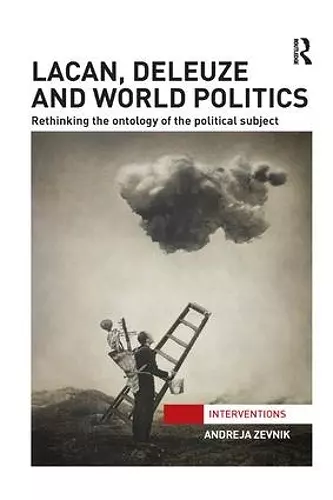Lacan, Deleuze and World Politics
Rethinking the Ontology of the Political Subject
Format:Paperback
Publisher:Taylor & Francis Inc
Published:26th Oct '17
Currently unavailable, and unfortunately no date known when it will be back
This paperback is available in another edition too:
- Hardback£160.00(9781138192713)

This book aims to re-think the way in which the subject is inscribed in the modern political, and does so by exploring the potentiality of Lacano-Deleuzian theoretical framework. It concerns a different ontology and a non-dualist understanding of political and legal existence, by focusing on questions such as how to think alternative notions of political existence and what kind of political, social and legal order do these come to create.
This investigation into political appearance of subjects through concepts of law, body and life is led and influenced by the thought of Gilles Deleuze and Jacques Lacan, as well as Alain Badiou, Antonio Negri and Slavoj Žižek. The book takes on various conceptualisations of life, explores the relationship between law and life and develops an alternative notion of legal and political existence in particular in the context of rights. On the back of Guantánamo’s legal and political discourses this work aims to show why and how the problems of world politics or the limitations of (human) rights discourse require an engagement with questions such as what it means to exist as a human being, what forms of life are politically recognised, which are not, and why this distinction.
By pointing to a different ontology for thinking and understanding global politics and demonstrating how a trans-disciplinary and philosophical approaches can foster the debates in world politics, this book will be of interest to postgraduates and scholars working on critical normative ideas in international politics, critical security studies and critical legal studies.
'Zevnik's book addresses the profound question of how a non-exclusive political may be produced. Her impressive argument draws on the work of Lacan and Deleuze, as well as examples of micro-political practices in Guantanomo, to construct an innovative and provocative answer.' -Professor Kimberly Hutchings, Queen Mary University of London, UK
'The critique of the modern political subject is widely regarded and practiced as a core element of International Relations theory. Yet as these practices gradually settle into mainstream theory, they become less the answer to the questions they originally sought to address, and more part of the problem. Andreja Zevnik’s re-thinking of the political subject as a question of political existence knocks critique out of its comfort zone. By reconstructing the discourse of law in Deleuze and in the later texts of Lacan, she opens up a fundamental set of questions about the ontological foundations of reality and about the theoretical consequences these foundations have for our understanding of subjectivity, demonstrating its timeliness through a deep-going and sustained analysis of the political subject at Guantánamo. The book is made up of a subtle and yet robust set of readings that successfully navigate IR theory’s deeply ingrained assumptions about the foundation and continuity of the Cartesian subject. It is risky enterprise, carried out by the author with an uncommonly steady hand.' -J. Peter Burgess, Free University Brussels (VUB), Belgium
'Zevnik's book addresses the profound question of how a non-exclusive political may be produced. Her impressive argument draws on the work of Lacan and Deleuze, as well as examples of micro-political practices in Guantanomo, to construct an innovative and provocative answer.' - Professor Kimberly Hutchings, Queen Mary University of London, UK
'The critique of the modern political subject is widely regarded and practiced as a core element of International Relations theory. Yet as these practices gradually settle into mainstream theory, they become less the answer to the questions they originally sought to address, and more part of the problem. Andreja Zevnik’s re-thinking of the political subject as a question of political existence knocks critique out of its comfort zone. By reconstructing the discourse of law in Deleuze and in the later texts of Lacan, she opens up a fundamental set of questions about the ontological foundations of reality and about the theoretical consequences these foundations have for our understanding of subjectivity, demonstrating its timeliness through a deep-going and sustained analysis of the political subject at Guantánamo. The book is made up of a subtle and yet robust set of readings that successfully navigate IR theory’s deeply ingrained assumptions about the foundation and continuity of the Cartesian subject. It is risky enterprise, carried out by the author with an uncommonly steady hand.' - J. Peter Burgess, Free University Brussels (VUB), Belgium
'This is a powerful theoretical treatise and compelling application by an author who is peerless among IR scholars in her analyses of ontology's, subjectivity's, and desire's relationships with global politics.' - Michael J. Shapiro, University of Hawai'i, Manoa
ISBN: 9780815377863
Dimensions: unknown
Weight: 453g
226 pages